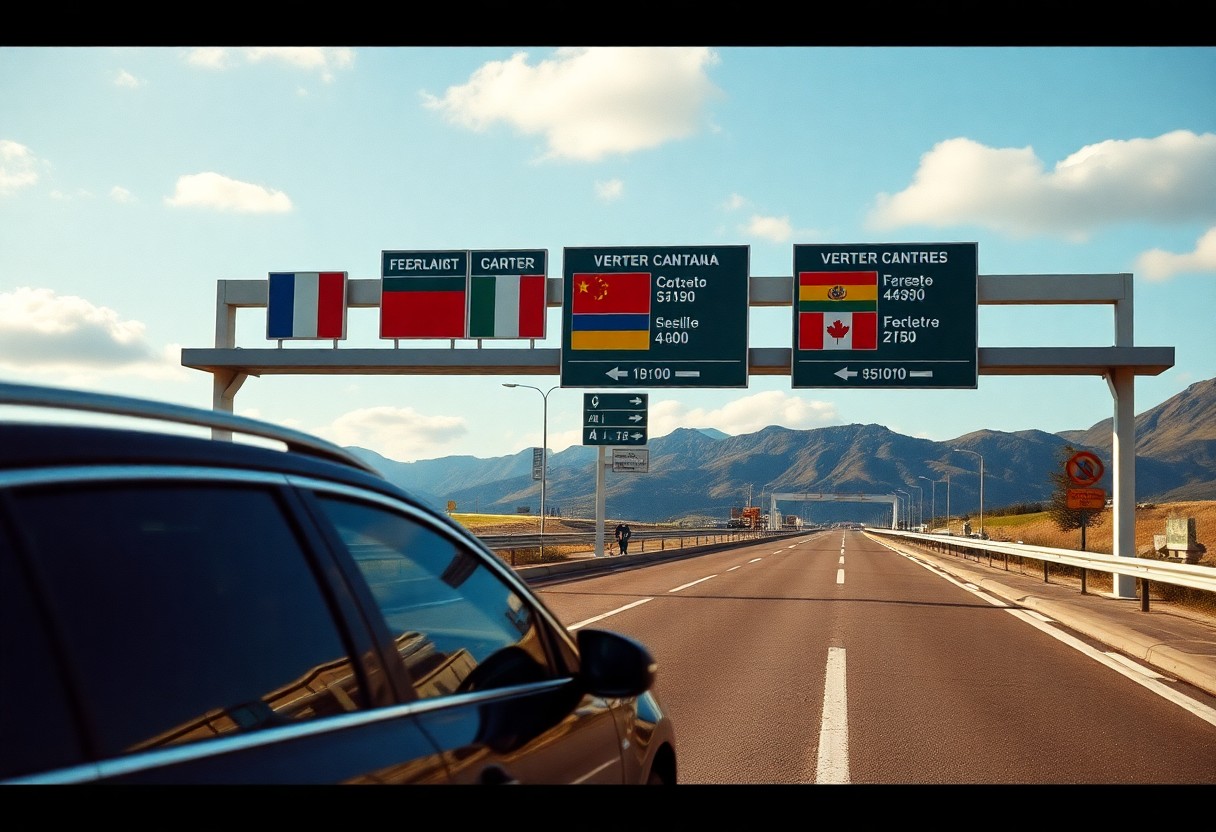When planning an exciting road trip across Europe using a rental car, meticulous preparation is essential for ensuring a smooth and enjoyable experience. This includes not only carefully charting your travel route but also having a thorough understanding of the cross-border regulations that can have a significant impact on your journey. Rental companies frequently have varying policies regarding travel between European countries. Generally, most companies permit travel within Western European nations, but there are often restrictions when it comes to Eastern European countries. It’s crucial to carefully examine your rental agreement, which outlines the specific borders you are allowed to cross and any associated fees that may apply. Before confirming your reservation, ensure that your chosen rental agency permits travel to all your intended destinations, as non-compliance with cross-border regulations could render your insurance void and result in hefty penalties. Thus, acquiring detailed information about these policies is vital for a successful European road trip.
Understand the Legal Requirements for Cross-Border Driving in Europe
Before embarking on your European adventure with a rental car, it is crucial to meet the essential legal and rental company requirements. Make sure that your rental agreement explicitly indicates permission for cross-border travel, and verify that you possess valid insurance coverage for every country included in your travel plans. Many rental companies impose restrictions based on specific European zones, especially for premium vehicles. Therefore, it is imperative to educate yourself about these requirements to avoid any issues that could disrupt your travel experience. Understanding the legalities involved can save you from unexpected fines or complications while you explore the captivating beauty of Europe.
Obtain Your International Driving Permit (IDP) Prior to Your Trip
One of the most important documents needed for driving in Europe is the International Driving Permit (IDP). Acquiring this permit is not just advisable; it is mandatory and should be secured in your home country before you begin making travel arrangements. The IDP serves as a critical supplement to your regular driver’s license and is legally required in many European countries. By obtaining your IDP well ahead of time, you can ensure compliance with local driving laws, enhancing your driving experience across different nations and allowing you to immerse yourself in the stunning landscapes and rich cultural heritage that Europe has to offer.
Clarify Mileage Policies and Familiarize Yourself with General Restrictions
Renting a car in Europe often includes the appealing option of unlimited mileage, which is a significant advantage for travelers eager to discover new destinations. However, it’s essential to be aware that border crossing fees may apply, which can vary significantly, typically ranging from €5 to €47.60 per crossing. These fees depend on your rental provider and the specific countries involved in your itinerary. Additionally, due to insurance regulations and security protocols, rental agencies often impose specific restrictions based on different vehicle categories. For example, premium brands such as BMW, Mercedes, and Audi frequently have more limited travel zones compared to standard vehicles. Therefore, it’s crucial to communicate your travel intentions with your rental agency in advance to prevent any unforeseen expenses or complications during your journey.

Become Familiar with the Cross-Border Policies of Major Rental Companies
When renting a car in Europe, comprehending the unique cross-border policies of each rental company is essential for ensuring a successful travel experience. Major rental providers typically permit travel between Western European countries; however, stringent restrictions often apply for Eastern European destinations. The policies can vary greatly depending on the type of vehicle you choose, as luxury cars often face more limitations compared to standard models. By familiarizing yourself with these policies in advance, you can make informed decisions about your rental options and better plan your travel itinerary.
Investigate the Cross-Border Regulations from Avis and Enterprise
Avis and Enterprise are notable rental companies that offer extensive coverage across Western Europe. Their vehicles are generally allowed to travel in most EU countries, including sought-after destinations like France, Germany, and Spain. However, it’s crucial to acknowledge that both companies impose specific restrictions on luxury vehicles, particularly when entering Italy. For instance, Enterprise charges a daily cross-border fee of 5 euros, with a total maximum fee of 50 euros. Being informed about these charges will assist you in effectively budgeting for your travels across the diverse landscapes of Europe.
Examine the Cross-Border Driving Policies of AutoEurope and Hertz
Among the leading rental providers, AutoEurope and Hertz enforce specific country restrictions that are vital for travelers to understand. For instance, taking their vehicles into Eastern European nations such as Albania, Belarus, or Ukraine is strictly prohibited. Furthermore, Hertz restricts luxury vehicles and SUVs from accessing Italy, while AutoEurope’s policies may differ depending on their local partners. Therefore, it is essential to discuss your travel plans with your chosen provider before booking your rental car. Your rental agreement will detail the applicable cross-border fees, which can vary by company and destination. For example, Hertz charges 47.60 euros for crossing from Germany to another approved country, and you may require additional insurance coverage for international travel.
Stay Informed About Geographical Restrictions When Traveling
The regulations governing cross-border travel with rental cars in Europe can vary significantly based on the rental company and the type of vehicle you select. Your rental agreement will clearly specify which countries you are permitted to visit with your rental car. It is crucial to keep your rental agency informed of your planned route, as crossing borders without proper authorization can void your insurance and lead to severe penalties, potentially resulting in a frustrating experience during your travels.
Identify the Countries You Are Authorized to Drive In
Most rental companies allow driving freely within Western European nations, including France, Germany, and Spain. Zone 1 countries typically contain EU member states in Western Europe, providing the most flexibility for your rental vehicle usage. Your rental agreement will list all the permitted countries applicable to your vehicle class, ensuring you have a clear understanding of where you can travel, enabling you to maximize your European adventure.
Recognize the Restricted Areas for Rental Cars
Countries that were behind the Iron Curtain often face stringent travel restrictions. Most rental companies prohibit travel to Eastern European nations, including Albania, Belarus, Ukraine, and Russia, due to increased risks and potential insurance complications. Furthermore, additional limitations may apply specifically to luxury vehicles and certain car brands. High-end vehicles such as BMW, Mercedes, and other premium models often face stricter geographical limits. If your travel itinerary includes several countries, it is advisable to opt for a standard vehicle class to enhance flexibility and minimize potential fees or insurance complications.
Comprehend Vehicle-Specific Limitations for Rental Cars
While rental companies may have different policies, most maintain strict regulations regarding which vehicles can cross borders. Therefore, it is crucial to review the specific limitations associated with your chosen vehicle class before proceeding with your booking. These restrictions are enforced to protect valuable assets and ensure compliance with insurance requirements across various European territories, thus safeguarding both the rental agency and the traveler.
Enjoy Greater Flexibility with Standard Rental Cars
Contrary to common misconceptions, standard rental cars actually offer the highest degree of flexibility for cross-border travel. Typically, you can drive standard vehicles in most Western European countries without needing special permits. However, it is essential to notify your rental agency about your travel intentions beforehand and be prepared to pay cross-border fees that can range from 5 to 50 euros depending on your circumstances and travel plans.
Understand Restrictions on Luxury Vehicles for Border Crossings
Significant restrictions apply to high-end vehicles concerning cross-border travel. Luxury cars face considerable limitations regarding border crossings, with famous brands like BMW, Mercedes, and Audi often prohibited from entering Eastern European countries or Italy. Generally, these premium cars are restricted to Zone 1 countries within Western Europe, which can significantly limit your travel options.
Additionally, if you decide to rent luxury vehicles, be prepared for higher security deposits and stricter insurance requirements. Rental companies such as Sixt and Enterprise impose limitations on premium brands like Jaguar, Maserati, and Porsche, permitting them only in select Western European countries. For any border crossings, you will need special permission and potentially additional insurance coverage to comply with rental policies.
Budget Effectively for Border Crossing Costs
When preparing for any cross-border trips in Europe with a rental car, it is essential to maintain a clear budget. Most rental companies apply additional fees for crossing borders, even within the Schengen Area, which can impact your travel finances. It is crucial to communicate your travel plans to your rental agency and obtain written permission before crossing any borders to avoid unexpected financial burdens.
Typical Fees for Border Crossings to Anticipate
Border crossing fees in Europe generally range from €5 to €50, depending on the rental company and specific situations. For instance, crossing from Germany to another approved country might incur a fee of €47.60 with Hertz, whereas Enterprise charges €5 per day, with a maximum limit of 50 euros for trips starting in Germany. Being aware of these fees in advance will assist you in better financial planning during your travels throughout Europe.
Consider Potential Additional Charges You May Encounter
At some borders, you might face extra insurance requirements and documentation fees. Your rental company might impose charges for special permits, especially when traveling to Eastern European countries or when using luxury vehicles. Additionally, it’s prudent to consider the chances of higher insurance premiums for specific destinations, particularly in Italy or Eastern Europe. Remember that certain credit card insurance policies may not cover all European nations, necessitating the purchase of additional coverage from your rental agency to ensure peace of mind during your travels.

Master the Essentials of Ferry Travel with Your Rental Car
Not all rental companies have the same policies regarding ferry travel in Europe. While most companies permit ferry travel, it is crucial to verify the specific rules associated with your rental to avoid complications. Crossing water borders often requires additional documentation and may incur extra fees that you should be prepared for. Furthermore, your insurance coverage may change when traveling by ferry, making it essential to understand these aspects well ahead of your journey.
Review Company-Specific Policies on Ferry Travel
Among the leading rental companies, policies concerning ferry travel can differ significantly. Avis and Hertz generally allow ferry travel to approved countries, but it is essential to check destination restrictions beforehand to prevent potential issues. Conversely, Enterprise and Sixt may require pre-authorization and additional insurance for ferry crossings, which must be explicitly stated in your rental agreement to avoid misunderstandings during your trip.
Critical Considerations for Breakdown Coverage During Ferry Travel
An additional vital factor to consider is vehicle breakdown coverage while traveling by ferry. Most rental companies hold you responsible for vehicle repatriation costs if your car breaks down after a ferry trip, which can amount to thousands of euros, depending on your location and the type of vehicle rented. This obligation extends beyond mechanical failures; if you experience an accident or the vehicle becomes unusable for any reason while on an island, you are liable for the expenses necessary to return the vehicle to the original rental location. Some rental companies offer additional insurance to cover these costs, but it is crucial to secure this coverage before your journey to ensure you are adequately protected.
Key Insights for Successful Cross-Border Driving with Rental Cars
When planning to drive a rental car across European borders, thorough research and an understanding of the specific regulations set by your rental company are essential for a smooth experience. While you may enjoy the freedom to cross borders in many European countries, each rental company has its own set of policies and associated fees that you should be aware of. The type of rental vehicle you choose can greatly influence your travel flexibility, particularly with luxury cars often facing stricter limitations than standard models. Always verify the countries you can visit, account for any required border crossing fees, and check the regulations regarding ferry travel before embarking on your journey. Diligently reading your rental agreement and acquiring an International Driving Permit will further prepare you for a seamless experience. Your proactive planning is key to avoiding complications at border crossings, allowing you to relish a more enjoyable travel experience.
Your Questions Answered: Driving Rental Cars in Europe
Can I drive my rental car to any European country?
No, rental companies enforce specific regulations regarding the countries you can visit. Most companies allow travel within Western European nations such as France, Germany, and Spain. However, many impose restrictions on travel to Eastern European countries including Albania, Belarus, and Ukraine. Luxury vehicles often come with even more stringent limitations. Always check your rental agreement for the allowed countries before any border crossings to ensure compliance.
Will I incur additional fees for crossing borders with a rental car in Europe?
Yes, many rental companies do impose border crossing fees. For example, Hertz charges 47.60 euros for each border crossing from Germany, while Enterprise charges 5 euros per day (with a maximum cap of 50 euros) for trips originating in Germany. These fees apply even when traveling within the Schengen Area. It is crucial to inform the rental company about your travel itinerary and settle these fees before crossing any borders to avoid unexpected charges.
Can I take my rental car on a ferry between European countries?
Yes, most rental companies allow ferry travel if your destination country is on their approved list. However, if your vehicle breaks down while on an island, you will be responsible for the costs associated with returning the vehicle to its original rental location. Some companies, such as Hertz, offer coverage for ferry travel through their insurance options (CDW, TP, or SuperCover). Always verify the specific ferry policies stated in your rental agreement to avoid any surprises during your travels.
The Article: Is It Allowed to Drive a Rental Car Across European Borders? appeared first on https://rentacar24.org/
The Article Driving a Rental Car Across European Borders: Is It Allowed? Was Found On https://limitsofstrategy.com
The Article Driving a Rental Car Across Borders in Europe: Guidelines First Appeared ON
: https://ad4sc.com

Comments are closed